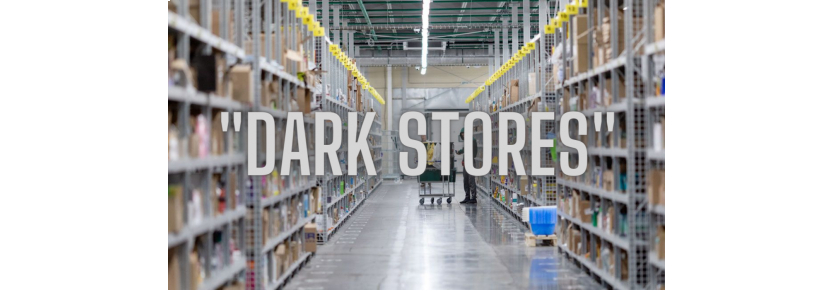- Online Help
- Service hours: 09:00-20:30
- Stores
- Download Catalogue

The growing necessity amongst the people in our society for obtaining goods and services on an instant basis, as quickly as possible, has led to the rise of a concept known as a Dark store. And no, these aren't stores without any electric supply.
Careem, a well-known player in the game with a super app, based in Dubai, predicts that its dark store coverage in Dubai will have a 90% of range in the next quarter. The "Quik" feature on their app promises that the delivery of goods will be done in an hour.
So what is a dark store? How does it function? And will it bring about a revolution in the Post-Pandemic retail sector? Keep reading to find out!
What Is The Meaning Of The Term "Dark Store"?
Now, let's start from the basics. A dark store is a type of warehouse explicitly catering to online order placements. In the case of a dark store, customers are not allowed to visit the store and shop for themselves, and goods will be delivered to them after placing an online order.
The most prominent rival of dark stores is the existing supermarket or grocery store industry. But the added feature of getting delivery at one's home seems to provide more convenience, leading to the growth of dark stores ever since the Covid-19 crisis subsided.
It is estimated that the retail industry of the UAE will be valued at USD 75 Billion by 2025.
Origin And History Of Dark Stores
Dark stores are also known as dark supermarkets and dotcom centers. The concept of dark stores originated in the United Kingdom during the early 2000s, according to Wikipedia.
According to an article, the first-ever "dark store" in the Middle East was established in Kuwait by an organization named Talabat. Click here to read about it in detail! Talabat promised delivery of grocery items within a time period of only 15-20 minutes! How cool is that?
Dark Stores And The COVID-19 Pandemic
Covid-19 has been referred to as "The Great Accelerator" of the e-commerce industry. The pandemic has forced the business sector to find new ways to deliver grocery items because it felt like a risk at the time to have any human contact.
Also, with the majority of the workforce working from their homes, groceries and food items saw a spike in their demand. The retail sector got the necessary push that they needed to develop new models since supermarkets were shut down to avoid people gathering in one place.
Let us now look at the increase in the dark store sector in the Emirates, before and after the pandemic.
Growth Of Dark Stores In The United Arab Emirates (UAE)
The Middle East has been relatively reluctant to embrace the e-commerce trends, but the pandemic helped change that. Many new players emerged in the online retail sector, such as Dubai Store, Noon Daily, Areem, etc.
The already existing companies such as Spinneys and Mrsool also invested significant amounts of capital into expanding their online market.
It has been estimated that the online grocery sector of the United Arab Emirates has had a whopping increase of 300 percent since the Covid-19 crisis. It also states that Noon, which is a new variant of dark stores, established back in 2017, has spearheaded the foray of dark stores.
Are Dark Stores The Future Of The Retail Industry?
Back in 2020, Forbes published an article stating that even though the global crisis and the need for automation and instant fulfillment gave rise to dark stores, they might change the face of the retail industry permanently. And they were not wrong.
While every retail sector giant in the world hasn't adopted the dark store model yet, many brands have. Whole Foods, Bed Bath and Beyond, Walmart, Target, Kroger, Giant Eagle, etc., are some of examples. And with time, there will also be a growth of semi-dark stores, which will allow customers to only enter part of the stores.
Benefits Provided By Dark Stores In Retail Strategy
Dark stores provide multiple benefits for customers as well as retail companies. Let us look at those briefly.
In the case of consumers, quick deliveries of urgently required goods, contact-free purchases, a significantly more comprehensive range of products compared to traditional supermarkets, etc., are some of the most common benefits of dark stores.
While for retail companies, online shopping systems bring in more customers and recurring orders, and promote easy inventory control. Moreover, companies can save a ton of costs required for sleek finishes and designs of aisles since customers won't be allowed in dark stores.
Disadvantages Of Dark Stores
Dark stores provide more advantages than disadvantages, but there are specific cons to using this retail model as well.
Dark stores can only be opened by incurring a tremendous upfront capital expenditure. In addition, the transport costs and handling charges of groceries are also increased. Brands also lose their ability to sell directly to the customer, thus hindering the consumer-producer relationship.
Such a retail model will lessen the sales of neighborhood grocery stores and small businesses, leading to the loss of entrepreneurs.
Customers of such platforms may also be overly reliant upon them, which may create inconveniences in the future.
Conclusion
According to popular opinion, dark stores are predicted to turn around the retail strategy all over the globe. As far as the current situation is concerned, China has more dark stores than the rest of the world combined! But Emirates has multiple players in this market.
Due to the pandemic and global crisis, terms like "no-contact delivery" and "thirty-minute delivery guarantee" have gained importance, and this is why there is a huge possibility that it will be the next big thing and bring on the revolution.
Copyright © 2022 | www.creative-display.com | All rights reserved.
